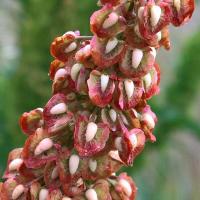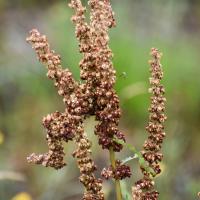Curly dock
Rumex crispus
Rumex crispus, commonly known as curly dock or yellow dock, is a perennial plant that belongs to the buckwheat family, Polygonaceae. Here's a more detailed look at its characteristics:
Botanical Description:
-
Habit:
- Curly dock is a perennial herb that can grow up to 1 to 4 feet (30 to 120 cm) tall.
-
Leaves:
- The leaves are large, lance-shaped, and have curly or wavy margins, giving the plant its common name. They are often marked with a prominent midrib.
-
Stems:
- The stems are usually reddish or greenish, stout, and may be branched in the upper part.
-
Inflorescence:
- The flowers are arranged in dense, whorled clusters or panicles, emerging from the upper leaf axils.
-
Flowers:
- The small, greenish flowers lack petals and have six tepals that are similar in appearance. The flowers are not showy.
-
Fruit:
- The fruit is a small, three-sided achene.
Identification Tips:
-
Curly Leaves:
- The most noticeable feature is the curly or wavy edges of the lance-shaped leaves, which are distinctive.
-
Whorled Inflorescence:
- Look for the dense clusters of flowers arranged in whorls along the stem.
-
Stout Stem:
- The robust stem, often reddish or greenish, is characteristic of curly dock.
Ecological Role:
- Habitat:
- Curly dock is commonly found in disturbed areas, along roadsides, fields, and waste places. It can adapt to a wide range of soil conditions.
Culinary and Medicinal Uses:
-
Edibility:
- While the leaves are edible, they are known for their bitter taste. Young leaves can be cooked and used in certain dishes.
-
Medicinal Uses:
- Curly dock has been used in traditional herbal medicine. It is believed to have diuretic properties and has been used for various ailments, including skin disorders.
Management and Control:
-
Cultural Practices:
- Regular mowing or cutting can help control curly dock, especially before it produces seeds.
-
Mechanical Control:
- Hand-pulling or digging out the plant, especially when young, can be effective. Be sure to remove the entire taproot.
-
Herbicides:
- Selective herbicides labeled for use on broadleaf weeds may be used in areas where control is necessary. Follow recommended application rates and guidelines.
-
Preventive Measures:
- Preventing the establishment of curly dock by maintaining healthy and competitive vegetation can be an effective strategy.










